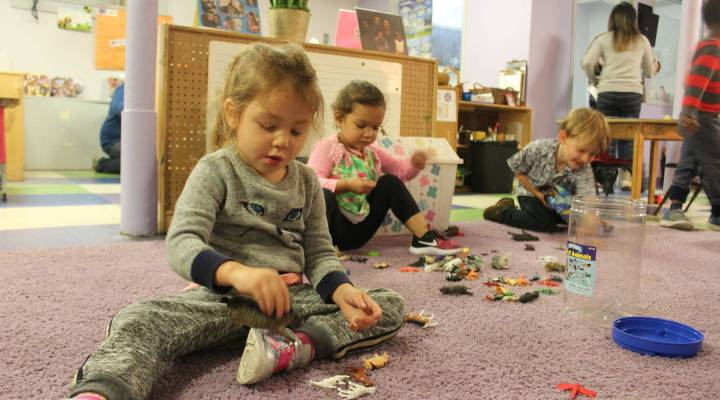
In an effort to save money, day care centers in New England are forming purchasing groups
In an effort to save money, day care centers in New England are forming purchasing groups

Kretcha Roldan runs a small nonprofit child care center in Somerville, Massachusetts just outside of Boston. Roldan juggles a lot at the Elizabeth Peabody House, in addition to regular classroom check-ins, she also keeps tabs on finances, and even checks in on building maintenance. One of her most important jobs though is keeping certified early childhood caregivers on staff.
In Massachusetts about 30 percent of employees in the childcare industry leave their jobs every year, mostly because of pay, which is only about $14 an hour on average in the state. But Melanie Asaro, who has been working with preschoolers at the Elizabeth Peabody House for the last four years says pay isn’t the only thing that matters.
“I feel like I’m in this for the long haul,” she said. “I mean it’s hard but again it’s very rewarding to see them take what you teach them.”
This day care runs on tight margins and Roldan explained, because of that, it can be hard to stay competitive with pay.
Officials in Massachusetts are hoping a new pilot program could help Roldan squeeze a little more room into her budget by making the supplies and services she needs, like a recent roof repair, a little more affordable. That’s something Roldan says comes at just the right time.
“We barely make it,” she said. “So anything that can help us on the expenses side of things is really helpful.”
The basic tactic is called shared services. Participating day care centers get access to a website where they can find discounted rates for everything from office supplies to accounting services.
“We created a model where they could share practices information, and even things like back office operations,” said Sunindiya Bhalla, the senior director of community impact at the United Way of Massachusetts Bay, the organization coordinating the effort.
Basically, the program treats the Elizabeth Peabody House and 11 other day care providers like one big purchasing group. That means more business for participating vendors.
The shared services model is still in the pilot stage in Massachusetts. But in neighboring New Hampshire, these purchasing groups are now common with more than 200 participating providers. It costs the state about $500,000 a year to run the program. It saves day care providers $5,000 – $10,000 a year. And Bhalla says most day care providers have been using that money to invest in workers.
“They are using them to stabilize salaries to be able to provide raises,” explained Bhalla. “They’re offering them discounts and savings.
Paying workers so they stay on longer saves money on hiring and training, said Marcy Whitebook, with the Center for the Study of Child Care Employment at the University of California Berkeley. She says day cares nationwide are trying everything right now to retain staff from housing stipends to tuition reimbursements.
“The strategies have been to fill the bucket with a hole in the bottom of it,” said Whitebook. “But we haven’t really restructured how these programs work.”
Since the childcare sector is mostly private, keeping fees competitive doesn’t leave much room for increasing worker pay, which is problematic because someone with similar credentials can make about twice as much working in a public school.
“We really do need to figure out how to transform the way we finance this,” Whitebook said.
For now, these shared services programs offer day care centers one way to make every dollar go a little farther.
There’s a lot happening in the world. Through it all, Marketplace is here for you.
You rely on Marketplace to break down the world’s events and tell you how it affects you in a fact-based, approachable way. We rely on your financial support to keep making that possible.
Your donation today powers the independent journalism that you rely on. For just $5/month, you can help sustain Marketplace so we can keep reporting on the things that matter to you.












